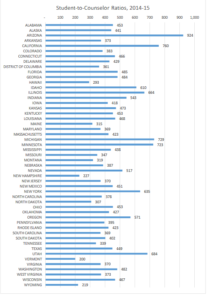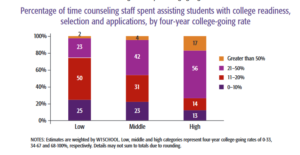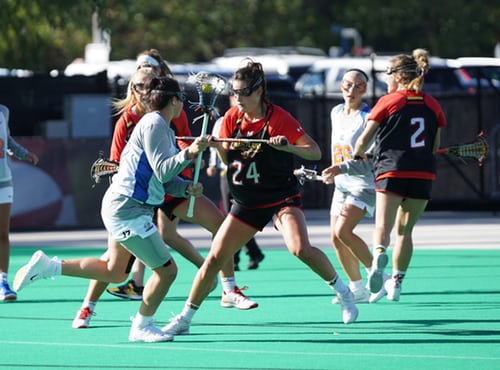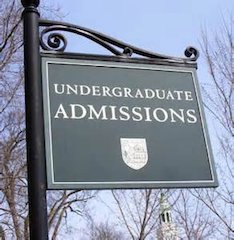High School Counselors and College Admissions
Last Updated on January 13, 2022 by Jill Schwitzgebel
Why do some families believe it is worthwhile to hire a college admissions consultant? News headlines from around the country over the past few years will give you some idea:
- From Texas in November 2017: “Responsible for as many as 900 students and under new leadership, Dallas ISD counselors feel the stress.“
- From Florida in June 2015: “HCPS seeks to ease workload of guidance counselors (who are reportedly hard-pressed to find time for guiding or counseling)”
- From Kansas in January 2018: “Kansas looking at hiring more school counselors, if they can be found.“
Simply put, most public high school counselors do not have the time they need to effectively work with each of their students individually on post-high school goals.
Counselor Workloads
The American School Counselor Association recommends that for best effectiveness, a guidance counselor’s caseload should not be higher than 250 students. However, the AVERAGE school counselor deals with a caseload of 482 students, nearly double the recommendation. This is at a time when the percentage of students applying to four year colleges is rising. Additionally, each of those students is now applying to more colleges than previously. In 2018, 35% of students applied to seven colleges! And naturally, these students are relying on their school counselors to advise and assist them in the process.
Given her heavy workload, I was disappointed, but not surprised, to hear our school’s usually knowledgeable college guidance counselor giving out some misinformation a couple of years ago. She told us that teacher recommendations are not needed on applications.
That’s a huge overgeneralization and I know she knows that’s not always true. Our state universities do not require them. Do other colleges? Yes! Do scholarship applications require them? Yes! But due to the large numbers of students she manages, it was much easier for her to generalize, giving parents the wrong impression. Just that one tidbit of misinformation could have a negative effect on a student’s application.

The Research Says…
Students that meet one-on-one with a college counselor are significantly more likely to attend college and apply for financial aid to get there. That type of college meeting is different from the five minutes that a student may spend with their high school counselor getting their schedule for next year approved. This report from the Education Commission of the States provides some key takeaways for college advising in our high schools.
Almost 70% of high schools that have high rates of college-bound students have counselors with caseloads of 250 students or less. Additionally, in schools with higher rates of college-bound students, those counselors report spending most of their time on college counseling. Ask yourself if a counselor with over 400 students has the time to individually advise their students for the best college outcomes? Or is their time dedicated to scheduling, logging student service hours, and other student concerns?

Ask your student’s guidance counselor how many students they are responsible for. That should give you an understanding of how much time they have available to work with your child on college advising.
Impacts
Possibly because of the workloads, high schools are often still behind when it comes to college admissions advising. For instance, Kid #3’s high school does not even hold their first meeting about the college admissions process until the second half of students’ Junior years.
That may have been okay twenty or even ten years ago, but today, that can put kids at a real disadvantage, particularly potential first-generation college students. By February of junior year, kids should have scheduled college visits (our state schools’ Admissions tours were already filled for spring break by the time of the meeting) or even have already visited a few schools.
See also: Where (and When) to Begin
By February of Junior year, those students also should have already scheduled some standardized test dates so that they would have plenty of time to take more than one, if necessary. But if they have not even had a meeting yet to talk about the process, most families have no idea what they need to do. As a result, they begin scrambling at the end of the student’s junior year.
Additionally, due to those counselor workloads, students may not get the college advice they need. If students are only told about state universities, rather than about other options, many families will look no further. Families frequently do not understand the financial aspects. They don’t realize that often, due to their endowments that provide financial aid and scholarships to students, a private university can be just as cheap as a public. Parents don’t know that an Ivy league education can actually be quite affordable if their child gets in. They don’t understand that there are schools that will meet their full financial need, and state universities frequently will not.
Counselors may not have the time to talk about scholarship opportunities that are available to your child or Honors college programs within the state universities, or any number of other programs available. Often, students are not told about the importance of the PSAT test in the National Merit scholarship contest.
One parent asked me what good was it to qualify as a National Merit finalist, since it didn’t come with a large scholarship, relatively speaking? She didn’t understand that it gave her child many other options, including free tuition and more, at many colleges. This is exactly the kind of thing that families may never know about without individual college advising.
The Consultant’s Role

Talking with someone who is dedicated to helping your child find the right college can save you money in the long run, as it may eliminate the desire for your student to transfer later. Or, more importantly, it may eliminate the desire to drop out because they are unhappy at a college that was never really ideal for them.
An advisor may help you navigate the financial aid game and understand what your real options are financially too. They will know what colleges best meet a family’s financial need. That alone can make investing in a college search and admissions consultant worthwhile. It’s not as expensive as some parents assume either. Most consultants have varying levels of services available and the cost may range from $50-$200/hour.
Your student will receive advice based on their individual situation, rather than general advice intended for large groups. But maybe the best thing a college advisor can offer your family is someone who can take some of the confusion and stress out of the college search and admissions process.










